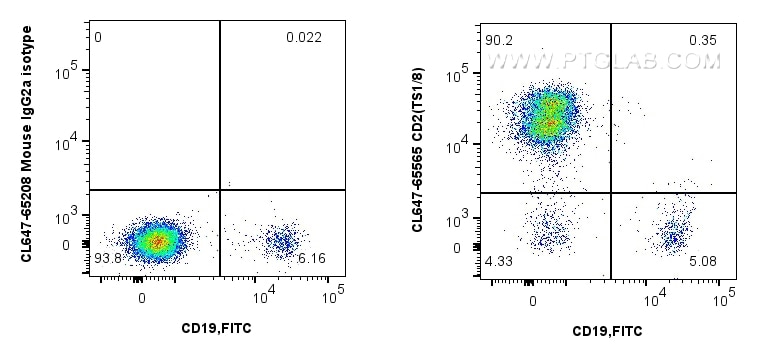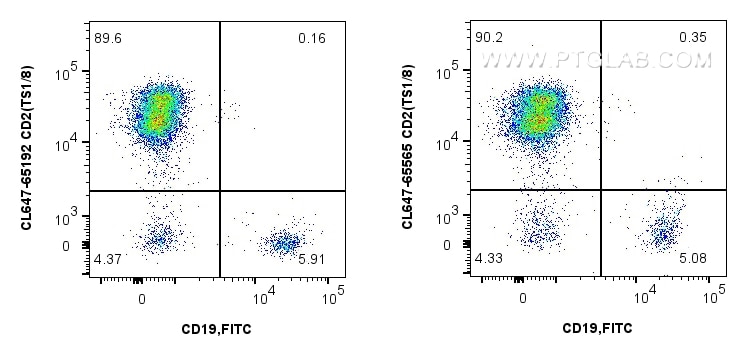Validation Data Gallery
Tested Applications
| Positive FC detected in | human PBMCs |
Recommended dilution
| Application | Dilution |
|---|---|
| Flow Cytometry (FC) | FC : 5 ul per 10^6 cells in 100 μl suspension |
| This reagent has been pre-titrated and tested for flow cytometric analysis. The suggested use of this reagent is 5 μl per 10^6 cells in a 100 µl suspension or 5 μl per 100 µl of whole blood. | |
| Sample-dependent, Check data in validation data gallery. | |
Product Information
CL647-65565 targets CD2 in FC applications and shows reactivity with Human samples.
| Tested Reactivity | Human |
| Host / Isotype | Mouse / IgG2a |
| Class | Recombinant |
| Type | Antibody |
| Immunogen | N/A 相同性解析による交差性が予測される生物種 |
| Full Name | CD2 molecule |
| Calculated molecular weight | 351 aa, 39 kDa |
| GenBank accession number | BC033583 |
| Gene Symbol | CD2 |
| Gene ID (NCBI) | 914 |
| ENSEMBL Gene ID | ENSG00000116824 |
| RRID | AB_3673617 |
| Conjugate | CoraLite® Plus 647 Fluorescent Dye |
| Excitation/Emission maxima wavelengths | 654 nm / 674 nm |
| Form | Liquid |
| Purification Method | Protein A purification |
| Storage Buffer | PBS with 0.09% sodium azide and 0.5% BSA{{ptg:BufferTemp}}7.3 |
| Storage Conditions | Store at 2-8°C. Avoid exposure to light. Stable for one year after shipment. |
Background Information
CD2 is a cell surface glycoprotein present on a majority of thymocytes, all mature T cells and subset of NK cells but not on B lymphocytes. It is a pan T-cell marker. CD2 interacts with lymphocyte function-associated antigen (LFA-3/CD58) and CD48/BCM1 to mediate adhesion between T-cells and other cell types. CD2 is implicated in the triggering of T-cells, the cytoplasmic domain is implicated in the signaling function.
Protocols
| Product Specific Protocols | |
|---|---|
| FC protocol for CL Plus 647 CD2 antibody CL647-65565 | Download protocol |
| Standard Protocols | |
|---|---|
| Click here to view our Standard Protocols |

